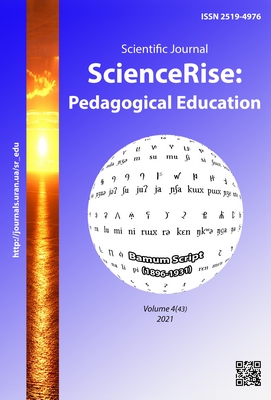Development of the target program in the institution of general secondary education regarding the management of the process of formation of business qualities of schoolchildren
DOI:
https://doi.org/10.15587/2519-4984.2021.238026Keywords:
program-target approach, management, target program, innovative orientation, strategic goalAbstract
The most effective in the first problems of managing lighting systems in the first place is the program-centralized input. In the paper, the last steps of the school curriculum are discovered and the process of shaping the school curriculum is controlled. In general, the development of the whole program with clearly defined goals, objectives, predicted results, which is balanced with personnel and minds, obvious resources, is necessary. In the statistics, it is indicated, that the main program is intended for such goals: it is directed to the forecast of changes, updating the effectiveness of the foundation of the development and implementation of the strategy of development; it can make innovations straightforward, ensures the systematicity of the processes in the implementation of the innovation; works on the mission of the school, laying foundation for the image.
The approximate structure of the program is determined: substantiation of the problem; theoretical and methodological foundations; the purpose and objectives of the program; stages of program implementation; measures for the implementation of the program; Expected results; analysis and evaluation of the results of the innovation program.
It is established, that the development of the program has the following support: organizational support of the program – modernization of the working curriculum in accordance with the conceptual objectives of the institution; regulatory and legal support of the program – adjustment of the package of documents: development programs of the educational institution; target programs, regulations; scientific and methodological support of the program – theoretical substantiation of the subject of experimental research work; creation of a diagnostic complex for studying the personal sphere of pupils; organization of seminars, pedagogical consultations, scientific-practical conferences as effective means of directing self-educational activity of teachers on improvement of own experimental-research competence; development of special courses, focused on the formation of business qualities of pupils; material and technical support of the program – improvement of development of a methodical office; creation of a media cabinet; expansion of the school library fund, use of Internet opportunities, etc.
References
- Martynets, L. (2020). Project technology implementation for development of business qualities in senior pupils. Journal of Critical Reviews, 7 (11), 891–895. Available at: http://dspace.lgnau.edu.ua/xmlui/bitstream/handle/123456789/2163/197-1592986403.pdf?sequence=1&isAllowed=y
- Pomelov, V. (1988). Vospitanie delovykh kachestv u shkolnikov. Moscow: O-vo Znanie, 48.
- Shvalbe, B. (1993). Lichnost, karera, uspekh. Moscow: AO Izdat. gruppa Progress-Inter, 228.
- Grinshpun, S. (1998). Lichnostno-delovoy potentsial shkolnika. Shkola, 5, 25–31.
- Kremen, V. H. (1999). Ratsionalnist yak diialnisnyi fenomen shkoliara. Uchytel, 11/12, 46–51.
- Bekh, I. D. (1994). Vidpovidalnist osobystosti yak meta vykhovannia. Pochatkova shkola, 9/10, 4–8.
- Orzhekhovska, V. (1996). Formuvannia sotsialnoi vidpovidalnosti uchniv u suchasnii shkoli. Pedahohika i psykholohiia, 4, 25–32.
- Savchyn, M. V. (1993). Problemy vyvchennia vidpovidalnosti yak sotsialno-psykholohichnoi yakosti liudyny. Pedahohika i psykholohiia, 4.
- Chaban, N. I. (2003). Formuvannia moralno-volovykh yakostei dilovoi liudyny u starshoklasnykiv. Kherson, 170.
- Hipters, Z. (2005). Vykhovannia dilovytosti i tvorchosti maibutnikh fakhivtsiv ekonomichnoho profiliu. Ridna shkola, 12, 49–51.
- Kaluhina, Yu. (2006). Problemy formuvannia moralno-etychnykh tsinnostei u fakhivtsiv finansovo-ekonomichnoho profiliu. Dukhovnist osobystosti: metodolohiia, teoriia i praktyka, 6 (19), 70–74.
- Morse, J. (1999). The Missing Link between Virtue Theory and Business Ethics. Journal of Applied Philosophy, 16 (1), 47–58. doi: http://doi.org/10.1111/1468-5930.00107
- Martynets, L., Stepanchenko, N., Ustymenko-Kosorich, O., Yashchuk, S. et. al. (2020). Developing Business Skills in High School Students Using Project Activities. Revista Romaneasca Pentru Educatie Multidimensionala, 12 (4), 222–239. doi: http://doi.org/10.18662/rrem/12.4/343
Downloads
Published
How to Cite
Issue
Section
License
Copyright (c) 2021 Liliia Martynets

This work is licensed under a Creative Commons Attribution 4.0 International License.
Our journal abides by the Creative Commons CC BY copyright rights and permissions for open access journals.
Authors, who are published in this journal, agree to the following conditions:
1. The authors reserve the right to authorship of the work and pass the first publication right of this work to the journal under the terms of a Creative Commons CC BY, which allows others to freely distribute the published research with the obligatory reference to the authors of the original work and the first publication of the work in this journal.
2. The authors have the right to conclude separate supplement agreements that relate to non-exclusive work distribution in the form in which it has been published by the journal (for example, to upload the work to the online storage of the journal or publish it as part of a monograph), provided that the reference to the first publication of the work in this journal is included.







